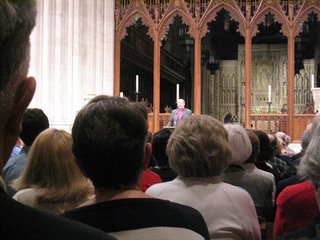
On Tuesday, May 16, five of us from The Well drove down to Washington D.C. to hear Bishop Wright speak at the National Cathedral as part of a book tour for his recently published work of apologetics,
Simply Christian. His talk was interesting, but not much more than an overview of his book. As usual, he emphasizes the this-worldliness of Christianity, the physical nature of the faith as rooted in creation, resurrection, and new creation. He focuses on the kingdom of God on earth as the work of the church. New creation is his overall theme and his summary of the Christian message: the new creation made possible by the life, death, and resurrection of Jesus Christ is individual, communal, and ultimately cosmic in nature--encompassing the reality of the world within the eschatological reality of God.

Wright's talk began with a very fascinating introduction about the rise of Gnosticism in the western world today. He strongly criticized both the left and the right, the former represented by Elaine Pagels, Dan Brown, and Bart Ehrman (all of which he mentioned by name) and the latter by Tim LaHaye and the
Left Behind series (and other dispensational-rapture fundamentalists who believe in an other-worldly god who takes us away from the world). He said all of this in the first several minutes, and that was probably the best part of the entire lecture. I entirely agree with this cultural critique, and some of my past posts have made the very same observations. Gnosticism is the greatest threat Christianity faces today, although it is important to remember that "threat" is a wholly human concern and that from God's side such things are of no concern. Christians should not fret over these cultural realities but rather trust wholeheartedly in the sovereign grace of God who acts to create, preserve, and redeem what belongs to God and God alone: this cosmos, humanity, the church, and the future kingdom.

The rest of the talk was intriguing but not as incisive or fresh. I criticize Wright for engaging in apologetics at all, which I believe is deeply problematic. This is no where more evident than in the opening chapters of both his book and his model,
Mere Christianity by C. S. Lewis. Both books begin by appealing to "universal" ideas and standards, things that are "common" to all people everywhere. Lewis fails on this point more than Wright, since he actually builds positively upon these universals--what he calls the Tao (taking a cue from Chinese philosophy) in
The Abolition of Man. Wright is better in that he uses these universals to establish something negatively--what humanity
lacks and is incapable of achieving, i.e., wholeness or the Good or shalom. Nevertheless, Wright still engages in this quasi-natural theology at the start of his book, and any engagement in apologetics requires some kind of rapprochement between Christianity and some extra-Christian idea or belief or philosophy. Christian theology needs to heed the following from Karl Barth:
The Gospel is not a truth among other truths. Rather, it sets a question-mark against all truths. The Gospel is not the door but the hinge. The man who apprehends its meaning is removed from all strife, because he is engaged in a strife with the whole, even with existence itself. Anxiety concerning the victory of the Gospel--that is, Christian Apologetics--is meaningless, because the Gospel is the victory by which the world is overcome. ... It [the Gospel] does not require representatives with a sense of responsibility, for it is as responsible for those who proclaim it as it is for those to whom it is proclaimed. It is the advocate of both. ... God does not need us. Indeed, if He were not God, He would be ashamed of us. We, at any rate, cannot be ashamed of Him. (The Epistle to the Romans, 35)
With that, I will close with a couple pictures. The first is our group standing with Bishop Wright. Todd is the pastor at the Well, while Kate, Jeff, and Gary are friends from the church. Gary will be a senior at PTS in the fall, and he is just now finishing up his pastoral internship with the strong likelihood of being hired down the road (perhaps a very short road). The last picture is the National Cathedral after Wright's talk as we headed back to the car.


 On Tuesday, May 16, five of us from The Well drove down to Washington D.C. to hear Bishop Wright speak at the National Cathedral as part of a book tour for his recently published work of apologetics, Simply Christian. His talk was interesting, but not much more than an overview of his book. As usual, he emphasizes the this-worldliness of Christianity, the physical nature of the faith as rooted in creation, resurrection, and new creation. He focuses on the kingdom of God on earth as the work of the church. New creation is his overall theme and his summary of the Christian message: the new creation made possible by the life, death, and resurrection of Jesus Christ is individual, communal, and ultimately cosmic in nature--encompassing the reality of the world within the eschatological reality of God.
On Tuesday, May 16, five of us from The Well drove down to Washington D.C. to hear Bishop Wright speak at the National Cathedral as part of a book tour for his recently published work of apologetics, Simply Christian. His talk was interesting, but not much more than an overview of his book. As usual, he emphasizes the this-worldliness of Christianity, the physical nature of the faith as rooted in creation, resurrection, and new creation. He focuses on the kingdom of God on earth as the work of the church. New creation is his overall theme and his summary of the Christian message: the new creation made possible by the life, death, and resurrection of Jesus Christ is individual, communal, and ultimately cosmic in nature--encompassing the reality of the world within the eschatological reality of God. Wright's talk began with a very fascinating introduction about the rise of Gnosticism in the western world today. He strongly criticized both the left and the right, the former represented by Elaine Pagels, Dan Brown, and Bart Ehrman (all of which he mentioned by name) and the latter by Tim LaHaye and the Left Behind series (and other dispensational-rapture fundamentalists who believe in an other-worldly god who takes us away from the world). He said all of this in the first several minutes, and that was probably the best part of the entire lecture. I entirely agree with this cultural critique, and some of my past posts have made the very same observations. Gnosticism is the greatest threat Christianity faces today, although it is important to remember that "threat" is a wholly human concern and that from God's side such things are of no concern. Christians should not fret over these cultural realities but rather trust wholeheartedly in the sovereign grace of God who acts to create, preserve, and redeem what belongs to God and God alone: this cosmos, humanity, the church, and the future kingdom.
Wright's talk began with a very fascinating introduction about the rise of Gnosticism in the western world today. He strongly criticized both the left and the right, the former represented by Elaine Pagels, Dan Brown, and Bart Ehrman (all of which he mentioned by name) and the latter by Tim LaHaye and the Left Behind series (and other dispensational-rapture fundamentalists who believe in an other-worldly god who takes us away from the world). He said all of this in the first several minutes, and that was probably the best part of the entire lecture. I entirely agree with this cultural critique, and some of my past posts have made the very same observations. Gnosticism is the greatest threat Christianity faces today, although it is important to remember that "threat" is a wholly human concern and that from God's side such things are of no concern. Christians should not fret over these cultural realities but rather trust wholeheartedly in the sovereign grace of God who acts to create, preserve, and redeem what belongs to God and God alone: this cosmos, humanity, the church, and the future kingdom. The rest of the talk was intriguing but not as incisive or fresh. I criticize Wright for engaging in apologetics at all, which I believe is deeply problematic. This is no where more evident than in the opening chapters of both his book and his model, Mere Christianity by C. S. Lewis. Both books begin by appealing to "universal" ideas and standards, things that are "common" to all people everywhere. Lewis fails on this point more than Wright, since he actually builds positively upon these universals--what he calls the Tao (taking a cue from Chinese philosophy) in The Abolition of Man. Wright is better in that he uses these universals to establish something negatively--what humanity lacks and is incapable of achieving, i.e., wholeness or the Good or shalom. Nevertheless, Wright still engages in this quasi-natural theology at the start of his book, and any engagement in apologetics requires some kind of rapprochement between Christianity and some extra-Christian idea or belief or philosophy. Christian theology needs to heed the following from Karl Barth:
The rest of the talk was intriguing but not as incisive or fresh. I criticize Wright for engaging in apologetics at all, which I believe is deeply problematic. This is no where more evident than in the opening chapters of both his book and his model, Mere Christianity by C. S. Lewis. Both books begin by appealing to "universal" ideas and standards, things that are "common" to all people everywhere. Lewis fails on this point more than Wright, since he actually builds positively upon these universals--what he calls the Tao (taking a cue from Chinese philosophy) in The Abolition of Man. Wright is better in that he uses these universals to establish something negatively--what humanity lacks and is incapable of achieving, i.e., wholeness or the Good or shalom. Nevertheless, Wright still engages in this quasi-natural theology at the start of his book, and any engagement in apologetics requires some kind of rapprochement between Christianity and some extra-Christian idea or belief or philosophy. Christian theology needs to heed the following from Karl Barth:

Comments
shane
On a more personal note, and to give an anecdotal argument, Lewis' Mere Christianity is a major part of the reason I am a Christian. After college I had adopted what I perceive as the majority cultural position toward Christianity -- namely, I saw it as a nice venerable tradition, but as something that had to be simply "taken on faith" (as the world understands faith). That is, if it was to be accepted at all, it was to be accepted with a wink and a nod, knowing that it was all basically superstition. And so I had conveniently reduced Christianity to an entirely content-free piety. Of course, I knew next to nothing about Christianity except that Jesus "had been nailed to a tree for saying how great it would be to be nice to people for a change" (to quote Douglas Adams, which I would have then).
Then I read Mere Christianity.
Now I had a degree from a liberal arts university, so I saw quite clearly what all the faults were in Lewis' arguments. I could easily see that they weren't "proofs" in any even moderately rigorous sense of the word. But I don't think he intended them as such. Rather, I think he intended them, as he says, as "clue[s] to the meaning of the universe." So I said to myself, "Hmmmm...." And then took the revolutionary step of reading the Bible, and somewhere along the way I heard the Gospel.
Lewis writes somewhere that a major task of apologetics is to help create an "intellectual climate is such that, when a man comes to the crisis at which he must either accept or reject Christ, his reason and imagination are not on the wrong side."
Lewis certainly did that. If Wright is attempting the same, I'm all for it.
I think Barth is right to say that the gospel requires no intellectual preconditions: it is the judgment upon all conditions and human achievements. The gospel is not a "truth among other truths" that requires us to clear a receptive space for its hearing. The gospel is pronounced and heard. It's reception and corresponding human response are the work of the Spirit.
I also am not sure that Lewis' position on apologetics regards the Gospel as "primarily a piece of knowledge". When he talks about coming to the crisis where you must accept or reject Christ, it sounds to me like an echo of Bultmann's "existential decision" (and Lewis' own story bears this out somewhat).
Barth sharply disagreed with Brunner and insisted instead on dogmatics, as the critical articulation of the tenets of Christian belief. Brunner felt that dogmatics were a leftover of old scholastic theology that had no purpose in reaching men and women today.
For more on this, read Bruce L. McCormack's book, pages 403-408.
From a Jüngelian perspective, the pursuit of eristics is deeply flawed in that it makes God necessary as a solution to a problem. Bonhoeffer, too, despised such a perversion of God and the gospel into a deus ex machina, a contrived use of God to solve some anthropological -- whether noetic or ontological -- 'problem' that only a transcendent Being can fix. Any view of God as necessary undermines the fundamental freedom and integrity of both God and humanity.
I think it's clear Lewis approached the Gospel with this idea of "cosmic" redemption. It's seen in most everything he wrote, esp. Narnia.
But rather than arguing that Christianity was a truth among many truths, Lewis contended that Christianity, or rather, its God, is Truth from which all truth stems, whether it's acknowledged as God's truth or not. Yes?
I too agree that apologetics is not the answer and is almost never an effective tool for "evangelism" anyway, especially not in the postmodern world we live in. As much as I love and respect Lewis' works, Mere Christianity is most likely my least favorite.
I add my own life to the gigantic stack of those touched and transformed by Lewis' work. That his apologetics might not stand the test of time is to be expected: In a hundred years time his concerns might not make any sense, and even now they seem dated, but an apologetic is necessarily geared to the cultural mileu to which it is addressed--like Andy said, see Mars Hill sermon.